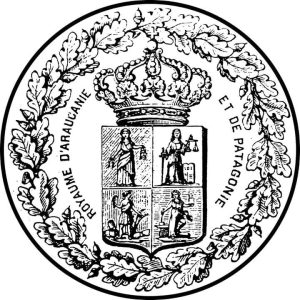
Kingdom of Araucania and Patagonia
Communique – 25 April 2023
The House of Araucania and Patagonia, deplore the shameless actions of four former officials’ attempted coup d’Etat and the subsequent unconstitutional appointment of an imposter to the throne of Araucania and Patagonia on 12 April 2023.
Prince Frederic I of Araucania and Patagonia was appointed legitimate successor to the late Prince Antoine IV by a majority vote of the Regency Council on 24 March 2018 in accordance with the elective constitution of the Kingdom. Under the constitutional system members of the State and Kings Councils must elect a successor by democratic consensus.
A Council of Regency is held under the strictest of constitutional conditions where the legitimate monarch has either passed away or has abdicated. The Council may not be formed whilst the monarch remains living, *Additional Act 2014, article 5.
The dismissal of four former members of the counsels of the Kingdom, on 21 March 2023, was carried out in full compliance with *articles 17 and 65 of the constitution of the Kingdom with the consent of both State and Kings Council with the abstention of two members.
To clarify, following their expulsion, of the remaining 8 officials, 6 abstained from participation in the illegal succession vote on the grounds of its unconstitutionality in conformity with articles *5, 6 and 7 of the additional Act 2014.
Rather than seek reconciliation, the expelled members instead instigated a coup d’Etat convening an illegal meeting to appoint a false successor to the throne in the absence of legitimate members of the Councils of the Kingdom nor the consent of the Prince, thus constituting an act of treason.
False claims that a regency council is currently presiding over the affairs of the Kingdom or that former pretender Phillipe Delorme was elected by due process via a ‘unanimous majority’ remain entirely fallacious.
We strongly condemn the premeditated confusion of public opinion as a means by which to secure power, albeit illegitimate. In doing so the attitude of former Kingdom officials is to wilfully act, ‘l’etat c’est moi’, to undermine the sanctity of the Kingdom.
*Constitution of Araucania and Patagonia (1860)
Article 17.- The councillors of the kingdom are appointed for life, but they can be dismissed by the King, for crimes, attacks, and plots against the internal and external security of the State, the person of the King and the members of his family, in short, for every act sullied by infamy.
«Article 65 – The ministers, members of the Council of the Kingdom, of the Council of State and of the Legislative Body, the officers of the army and the navy, magistrates and other public officials, issue an oath as well known: I swear obedience to the constitution and fidelity to the King and I promise to fulfil my duties with dignity and probity.
* Additional Provisional Act to the Constitution of Araucania and Patagonia (2014)
Article 5
The Regency is established to ensure the interim between the end of a Reign and the beginning of another.
The Regency opens with the finding of the vacancy of the throne, proclaimed by the Minister of State or the person who holds office. This vacancy results either from the death of the reigning Sovereign, or from his free and voluntary abdication.
Article 6
The Regency is exercised by a Council of Regency composed of a Regent, who is the spouse of the deceased Sovereign, as well as all the members of the Council of the Kingdom and the Council of State. In the absence of a spouse, it is the President of the Council of the Kingdom who automatically assumes the function. He can only take office when the throne is vacant.
Each member of the Council of Regency takes the following oath on assuming office: “On my honour, in my soul and conscience, freely and without constraint, before God and before men, in accordance with article 8 of the Act additional to the Constitution of the Kingdom of August 18, 2016, I swear to exercise the functions of Regent (or member of the Council of Regency) with scrupulous respect for the superior interest of the Araucan-Patagonian Monarchy, as well as with respect absolute of the laws, usages and customs of the Kingdom, without ever attempting to divert the monarchical rights of the legitimate successor. »
Article 7
The role of the Council of Regency is to control and ensure the transfer of the rights and duties granted to the King by the Constitution of November 17, 1860 and in accordance with the wishes of the deceased Sovereign and the provisions of this Additional Act. The Council of Regency must choose a successor, executing or interpreting the spirit of the doctrine established by the Augustus Founder of the Monarchy, and in agreement with the interests of the Crown and of the Arauco-Patagons.
To be able to designate a successor, at least two thirds of the members of the Council of Regency must be present or represented. The appointment is made by secret ballot and the candidate receiving the majority of the votes of the members present or represented will be elected. In the event of a tie, the Regent’s vote will be decisive.
